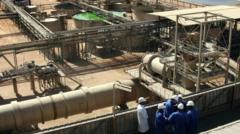In a statement, the junta argued that nationalization will lead to improved oversight and benefits for the Nigerien populace, underlining their intent to distance from France and attract closer ties with Russia. Somaïr has been operated by French nuclear fuels company Orano for decades, retaining a 63% stake. However, since the military coup in 2023, the junta has already seized operational control. Orano's response has yet to be officially stated, although their legal challenge against Niger signals potential conflict ahead.
As the world’s seventh-largest producer of uranium—famed for its rich ore—Niger’s decision reflects underlying sentiments surrounding the legacies of colonialism. Experts caution that the nationalization could disrupt both job security and the mining sector's future, critical for the nation’s economy.
Niger, having gained independence from France in 1960, has struggled with perceptions of continued domination via mineral agreements that favored France. As tensions simmer, the mining future remains uncertain, raising questions about the repercussions for both nations.
As the world’s seventh-largest producer of uranium—famed for its rich ore—Niger’s decision reflects underlying sentiments surrounding the legacies of colonialism. Experts caution that the nationalization could disrupt both job security and the mining sector's future, critical for the nation’s economy.
Niger, having gained independence from France in 1960, has struggled with perceptions of continued domination via mineral agreements that favored France. As tensions simmer, the mining future remains uncertain, raising questions about the repercussions for both nations.

















